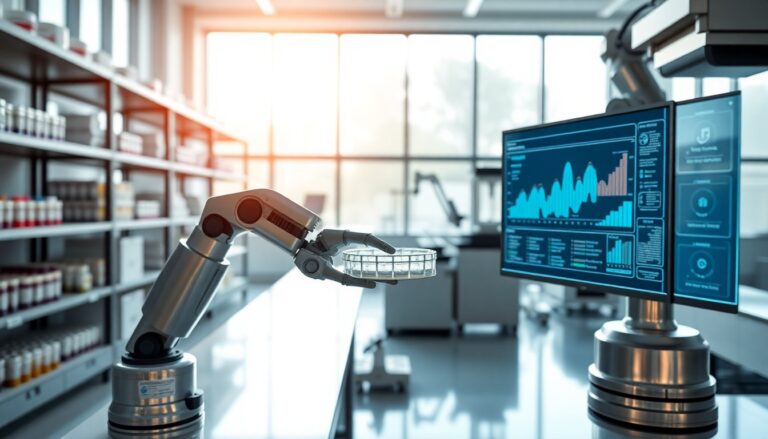Argomenti trattati
The integration of artificial intelligence (AI) and robotics is set to revolutionize the field of drug discovery, providing unprecedented speed and efficiency in developing new therapies. By harnessing vast amounts of data and automating processes, these technologies are not only accelerating the creation of effective medicines but are also paving the way for more personalized treatment options. As we delve into this evolving landscape, it becomes clear that the fusion of AI and robotics is reshaping the future of healthcare.
The Transformative Power of AI in Drug Discovery
Artificial intelligence is becoming a cornerstone in the biotechnology sector, significantly impacting areas such as precision medicine and clinical trials. The ability of AI to analyze extensive datasets enables researchers to identify optimal drug targets and design new molecules tailored for specific diseases. This capability was exemplified by Dr. Alex Zhavoronkov, co-CEO of a leading healthtech firm, who emphasized the importance of AI in advancing precision medicine.
One of the remarkable developments in AI-driven drug discovery is the utilization of generative algorithms to create novel drug-like molecules that meet stringent efficacy criteria across a spectrum of parameters. By analyzing historical data from clinical trials, AI tools can predict potential drug interactions and optimize treatment plans tailored to individual patient profiles. This shift towards data-driven decision-making not only enhances the likelihood of clinical success but also improves patient outcomes.
Moreover, the statistics surrounding clinical trials highlight the critical role AI plays in enhancing the success rate of drug development. With approximately 90% of drugs failing during clinical trials—especially in Phase II—there is a pressing need for advanced predictive tools. AI can streamline this process, providing insights that guide researchers in making informed choices regarding trial designs and patient selection.
Optimizing Clinical Trials with AI Tools
The challenges faced in clinical trials are multifaceted, and AI emerges as a vital ally in navigating these complexities. Dr. Zhavoronkov points out that their AI tool, inClinico, synthesizes diverse data sources—from clinical trials to drug characteristics—to create predictive models that assess the probability of a drug’s success in advancing through trial phases. Such tools can drastically reduce the time and resources wasted on unviable drug candidates.
This meticulous analysis empowers researchers to refine their strategies, allowing for better allocation of resources and a sharper focus on high-potential candidates. The predictive capabilities of AI not only bolster the chances of clinical success but also help in understanding the biological landscape of diseases, ultimately leading to more effective therapeutics.
As the pharmaceutical industry continues to grapple with the high attrition rates in drug development, the integration of AI in clinical trial optimization is proving to be a game-changer. It is transforming the traditional approach to trials, making them more efficient and data-driven.
The Role of Robotics in Bioprocess Optimization
In tandem with AI, robotics is enhancing bioprocess optimization, which is fundamental to the efficiency of drug manufacturing. Advanced robotic systems equipped with autonomous guided vehicles (AGVs) and dual-arm robots are streamlining processes such as cell culture and genomics analysis. These technologies not only expedite experiments but also ensure higher accuracy and consistency in data collection.
Dr. Zhavoronkov highlights that robotic automation allows for conducting a greater number of experiments simultaneously, leading to rapid data generation. This influx of data feeds back into the AI systems, which in turn refine their predictive capabilities, creating a virtuous cycle of improvement and innovation.
Furthermore, the integration of AI with robotics is proving essential in achieving sustainable and cost-effective biomanufacturing. By optimizing production processes and designing molecules suited to specific therapeutic targets, this combination minimizes waste and maximizes efficiency, addressing some of the critical challenges faced in traditional medicinal chemistry.
Conclusion: A New Era in Drug Discovery
Artificial intelligence is becoming a cornerstone in the biotechnology sector, significantly impacting areas such as precision medicine and clinical trials. The ability of AI to analyze extensive datasets enables researchers to identify optimal drug targets and design new molecules tailored for specific diseases. This capability was exemplified by Dr. Alex Zhavoronkov, co-CEO of a leading healthtech firm, who emphasized the importance of AI in advancing precision medicine.0
Artificial intelligence is becoming a cornerstone in the biotechnology sector, significantly impacting areas such as precision medicine and clinical trials. The ability of AI to analyze extensive datasets enables researchers to identify optimal drug targets and design new molecules tailored for specific diseases. This capability was exemplified by Dr. Alex Zhavoronkov, co-CEO of a leading healthtech firm, who emphasized the importance of AI in advancing precision medicine.1

